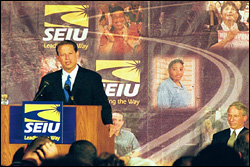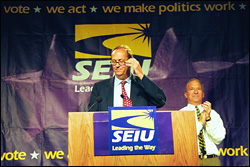 |
 |
|
P2000. Occasional Reports, Notes and Commentaries on the Road to the White House |
| Bradley and
Gore Vie for Labor Support
by Eric M. Appleman |
Back |
 |
 |
| May 28, 1999--Vice
President Al Gore says his support of organized labor is "in his bones."
Former Sen. Bill Bradley, challenging Gore for the Democratic nomination,
notes that he is "the only presidential candidate who has a union pension."
Appearances by Gore and Bradley at the Service Employees International
Union's legislative and political action conference in Washington earlier
this week show that both Democratic candidates are making a strong effort
to win the support of organized labor.
Differences in Tone and
Style
Speaking to reporters Bradley said he was dedicated "not to any kind of form, but to the goal, the objective of getting people covered." He said he would be announcing specific policies in September and October. "I guarantee whatever I put out on health care, it will be like raw meat to a cage full of wolves," Bradley stated. Of course, as a longshot, Bradley can afford to take some risks. Such unequivocal stances may give him an edge in gaining the support of progressives, who place social justice issues at the top of their agendas. For example, Bradley has won the backing of the most liberal member of the Senate, Paul Wellstone. Whether he can pick up support from progressive elements in the labor movement remains to be seen. Although some observers have characterized Bradley as boring, he has a certain star quality and is able to draw from his experiences as a basketball player for a wealth of stories which help him establish a connection with his audience. Gore more often recounts stories or jokes he has heard, and he at times seems prone to indulging in some fairly sharp partisan rhetoric. "I am not about to let the Republican roll back labor rights," he declared, stating that, "If recent history is any guide, we can expect them to try to silence working familes, to try to privatize Social Security, to try to drain away education funding with vouchers, to try to pass national right-to-work laws, to try to pass national paycheck deception, to try to weaken the NLRB." Gore: "I am pro-union,
I am pro-worker, I am pro-organizing...in my bones."
Bradley: "For nine years
I was a shop steward."
Most Labor Endorsements
to Come Later
In addition to the AFL-CIO endorsement, each of the AFL-CIO's 72 national unions has its own endorsement procedure. The AFL-CIO has requested that the national unions hold off on endorsements until after its Executive Council meets in August. In a February statement, the AFL-CIO Executive Council advised its constituent unions to engage in member education and seek member input. Most of the member unions have held off; the SEIU is a case in point. The union has set out four priorities: strengthen Social Security and Medicare, provide health care for all, guarantee freedom to join a union, and support efficient and accountable public services, not privatization. On April 22 SEIU sent a questionnaire reflecting those priorities to all major Democratic and Republican candidates. The form was due back on May 14; only Gore and Bradley responded. The responses will be made available to members at worksites, in the SEIU magazine and on its website. Another example of this type of approach, albeit from a union that is not part of the AFL-CIO, is the endorsement process of the 2.4 million member National Education Association. The leadership of the NEA's PAC, the NEA Fund for Children and Public Education, will meet on June 29 during the NEA's annual gathering, the Representative Assembly. During that PAC council meeting, representatives will approve a questionnaire for distribution to the candidates, and the candidates will be invited to participate in an interview process with NEA President Bob Chase. These interviews will likely take place in August or September. The earliest a primary-only endorsement could occur would be at the PAC council's next meeting in the first part of October. If the council acts, its recommendation must then be approved by the NEA's board of directors. Thus far only a couple of national member unions of the AFL-CIO have made endorsements, both for Gore. On January 21 the International Association of Fire Fighters, representing 225,000 professional fire fighters and EMS personnel, formally endorsed Gore after the unanimous vote of its executive board. Gore had spoken at the IAFF's legislative conference in March 1998. At the time of the SEIU speech, IAFF members had already begun mobilizing for Gore; IAFF members wearing distinctive yellow IAFF Gore shirts greeted Gore during a visit to Atlanta (a photo of this happening was put at the top of the Gore 2000 website for a time). On February 16 the 630,000-member Communications Workers of America announced its endorsement of Gore; according to a statement, polling of CWA members showed they "overwhelmingly favor Gore." Trade Concerns
Gore's Speech to SEIU,
May 23, 1999
|
|||